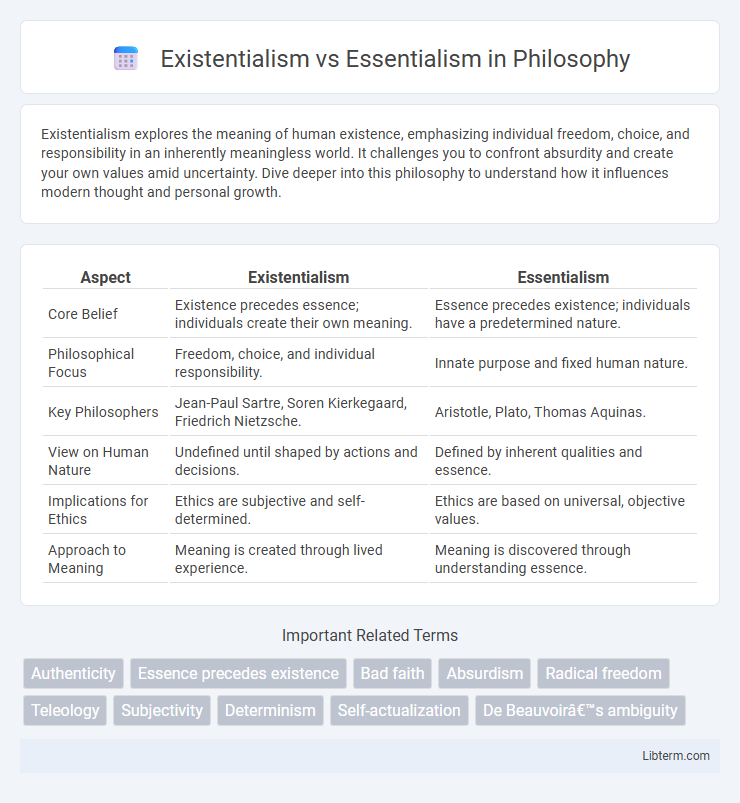Existentialism explores the meaning of human existence, emphasizing individual freedom, choice, and responsibility in an inherently meaningless world. It challenges you to confront absurdity and create your own values amid uncertainty. Dive deeper into this philosophy to understand how it influences modern thought and personal growth.
Table of Comparison
| Aspect | Existentialism | Essentialism |
|---|---|---|
| Core Belief | Existence precedes essence; individuals create their own meaning. | Essence precedes existence; individuals have a predetermined nature. |
| Philosophical Focus | Freedom, choice, and individual responsibility. | Innate purpose and fixed human nature. |
| Key Philosophers | Jean-Paul Sartre, Soren Kierkegaard, Friedrich Nietzsche. | Aristotle, Plato, Thomas Aquinas. |
| View on Human Nature | Undefined until shaped by actions and decisions. | Defined by inherent qualities and essence. |
| Implications for Ethics | Ethics are subjective and self-determined. | Ethics are based on universal, objective values. |
| Approach to Meaning | Meaning is created through lived experience. | Meaning is discovered through understanding essence. |
Introduction to Existentialism and Essentialism
Existentialism emphasizes individual freedom, choice, and personal responsibility, asserting that existence precedes essence and that humans create their own meaning through actions. Essentialism posits that individuals possess a predefined essence or nature that determines their purpose and identity before existence. These contrasting philosophies explore the relationship between human nature and self-definition, influencing various fields such as psychology, ethics, and education.
Core Principles of Existentialism
Existentialism centers on individual freedom, choice, and responsibility, asserting that existence precedes essence, meaning humans define their own nature through actions. It emphasizes authentic living by confronting anxiety, absurdity, and the inherent meaninglessness of life. Core principles include personal authenticity, subjective experience, and the rejection of predetermined human nature or essence.
Core Tenets of Essentialism
Essentialism asserts that individuals possess inherent, unchanging essences defining their identity and purpose, emphasizing fixed traits and predetermined roles. This philosophy underlines that reality consists of essential characteristics independent of perception, shaping human nature and morality. Core tenets include the belief in objective truths, the primacy of nature over nurture, and the existence of universal values guiding behavior and existence.
Historical Origins and Influential Thinkers
Existentialism emerged in the 19th and 20th centuries, heavily influenced by philosophers like Soren Kierkegaard and Jean-Paul Sartre, emphasizing individual freedom, choice, and the subjective meaning of existence. Essentialism traces its roots to classical philosophy, particularly Aristotle, who posited that entities possess inherent essences defining their nature and purpose. The contrast between Existentialism and Essentialism lies in the former's focus on existence preceding essence and the latter's assertion that essence precedes existence.
Human Nature: A Question of Essence or Existence
Existentialism argues that human nature is defined by existence itself, meaning individuals create their own essence through choices and actions rather than possessing a predetermined nature. Essentialism posits that human beings have an inherent essence or set of characteristics that determine their behavior and purpose before existence. The debate centers on whether essence precedes existence, shaping identity fundamentally, or if existence comes first, allowing essence to be formed dynamically by lived experience.
Freedom, Choice, and Responsibility
Existentialism emphasizes radical freedom, asserting that individuals create their own essence through authentic choices, bearing full responsibility for their actions and the consequences that define their being. Essentialism, by contrast, posits that human nature or essence precedes existence, suggesting fixed attributes or purposes limit freedom and guide choices within predetermined boundaries. The existentialist perspective prioritizes personal accountability and the evolving self, while essentialism anchors identity and responsibility in inherent characteristics or divine designs.
Meaning and Purpose in Life
Existentialism emphasizes individual freedom and the creation of meaning and purpose through personal choices, asserting that life has no inherent essence beyond what one defines. Essentialism argues that meaning and purpose are derived from an inherent nature or predetermined essence that defines human existence. These contrasting philosophies influence perspectives on authenticity, responsibility, and the search for life's significance.
Critiques and Counterarguments
Existentialism faces critiques for its emphasis on individual freedom, often seen as ignoring social and biological determinants, which essentialism argues are fundamental to identity. Essentialism counters existentialism by asserting that inherent, unchangeable traits define human nature, challenging the existentialist view of radical freedom and self-creation. Critics of essentialism highlight its potential to justify stereotypes and limit personal growth, advocating for the existentialist perspective that existence precedes essence.
Existentialism vs Essentialism in Modern Society
Existentialism in modern society emphasizes individual freedom, personal responsibility, and the creation of meaning through authentic choices, contrasting sharply with essentialism, which posits fixed, inherent traits defining human nature or social roles. Contemporary debates on identity, gender, and ethics often reflect existentialist views that challenge essentialist assumptions, promoting fluidity and subjective experience over predetermined categories. This dynamic shapes discussions in education, politics, and psychology, where existentialist principles encourage self-determination and reject essentialist stereotypes.
Conclusion: Key Differences and Implications
Existentialism emphasizes individual freedom, choice, and the creation of meaning through lived experience, rejecting predetermined essences. Essentialism asserts that entities possess inherent, defining characteristics that shape identity and purpose independent of personal experience. Understanding these philosophical frameworks informs diverse fields such as ethics, education, and psychology by highlighting the tension between fixed nature and dynamic existence.
Existentialism Infographic

 libterm.com
libterm.com